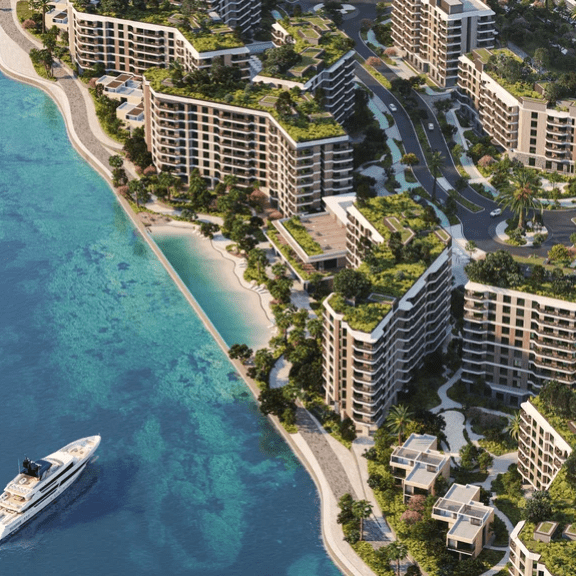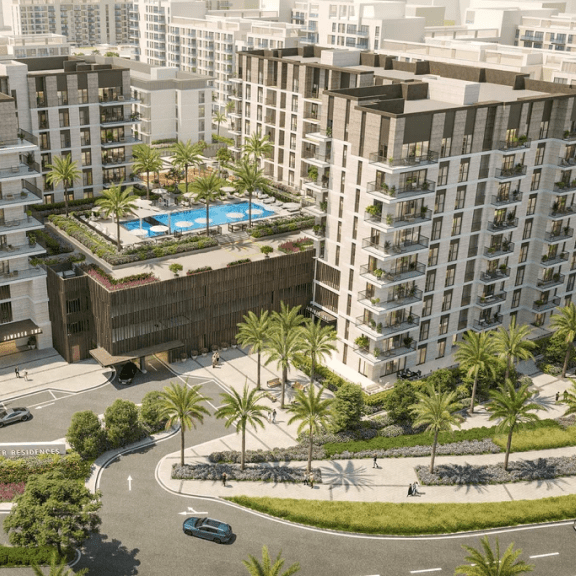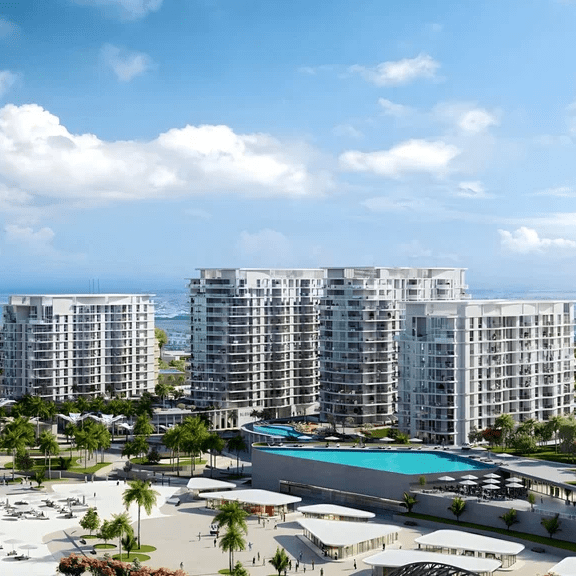Your home is often said to be “wherever you make it.” Many people stay in the countries and places they were born, only leaving for vacations and trips — for obvious reasons. But others take a bold step, either for a change of pace, new beginnings, career plans, or circumstances out of their control.
Meet Rita. For her and her family, home was initially Russia before she ventured to the United Kingdom. Two years later, she made her way to Remraam, Dubai. Through her eyes and experiences, let’s discover what you can expect from one of Dubailand’s most peaceful, colourful neighbourhoods.
Part I. Life in the UK
I first moved to the UK from Russia as a student in 2013. I spent five years studying in and around London. I married a British citizen but couldn't get a spouse visa because my husband, fresh out of university like me, didn't earn enough to sponsor me. This was during the cancellation of the graduate visa, a year-long option for international students. In 2018, with no sponsorship and the clock ticking, I returned to Russia with my husband, aiming to reenter the UK soon.
In 2021, after three years, we attempted to return to the UK. However, the typical spouse visa route was still closed — my husband needed six months of UK employment for sponsorship, but he was planning to pursue teacher training for at least a year. This left me with the option of seeking an employment visa. I arrived on a visit visa, job-hunted extensively, and faced challenges due to the complexity and cost of sponsorship for employers in the UK. Despite numerous applications and interviews, securing sponsorship proved elusive, given the reluctance of many employers to sponsor international employees.
London
Cost breakdown: Skilled Worker visa application, UK*
- Application fee — between £719 ($890) and £1,500 ($1,856)
- Healthcare surcharge — between £1,248 ($1,545) and £3,120 ($3,599)
- Proof of being able to support yourself — £1,270 ($1,572)
*The above fees depend on the visa length and can be covered by either the employer or the employee.
After three months of relentless job applications, I secured a position at a London marketing agency, guaranteeing sponsorship for three years. However, the offer came with a lower-than-advertised salary to cover visa fees, an immigration consultant, and a salary freeze for at least 2.5 years. With my tourist visa expiring, I accepted the offer, obtained a visa in six weeks, and returned to Russia. In December 2021, I reentered the UK as a skilled worker, starting my new job.
Given our financial constraints — my modest salary and my husband relying on student loans — we couldn't afford independent living in London. Despite working in the city, we settled in Kent, a well-connected town 45 minutes from central London. With limited time to research, we chose a place we liked, considering its low crime rates and decent infrastructure. Our budget allowed for a good studio flat, and fortunately, we swiftly found one — newly renovated, spacious, with a separate kitchen and a balcony, right in the town centre. We moved in within three weeks of my job start.
Kent
Cost breakdown: An unfurnished studio flat in West Kent, UK
- One-time deposit: £820 ($1,015)
- Monthly rent payments: £700 ($866)
- Bills: around £300 ($371), depending on the season
- Council tax: £110 ($136)
Budget-wise, commuting was a significant expense. Neither of us drives, relying solely on public transport, a common choice in the UK. My job allowed for a hybrid arrangement, requiring a weekly trip to London, sometimes even less. However, the round-trip cost was steep.
On the other hand, my husband's daily commute for work and training involved a coach, which was less costly than a train but still a notable budget factor due to its frequency.
Cost breakdown: Commuting from West Kent to London on a weekday
- The monthly price for a round trip via coach from West Kent to South London, five days a week: £400 ($495)
- One ticket from West Kent to Central London on a weekday, round-trip (including a railcard discount for people under 30): £28 ($35)
The impact of travel costs limited our weekends in London. Although reachable by train, the £25 ($31) round trip often made us reconsider. Steep prices for dining out and most leisure activities in the city exacerbated this.
Fortunately, our town had its charms, including friendly pubs, restaurants, Sunday markets, and beautiful parks.
Over the last two years in the UK, rising living costs, socio-political factors, persistent strikes disrupting transportation, and declining job stability became challenges. A few months before our move, several colleagues and I were faced with redundancy, which prompted us to contemplate a potential move elsewhere — despite our initial efforts to return to the UK.
City Hall, London. Photo: Mike Stezycki (Unsplash)
Part II. Moving to Dubai
Deciding to leave the UK again wasn't easy. As I mentioned earlier, and as is evident from my story, we went through a lot of trouble and effort to start a proper life there. But this life left us feeling insecure about finances and my residency status, and at times, it felt pretty restrictive. However, we did achieve something that could only have been done in the UK — getting my husband a combined British and international teaching qualification. This fact alone has opened the door to Dubai for us.
When we first started discussing the possibility of moving abroad, two locations stood out — Singapore and Dubai. Both large international hubs attract thousands of expats each year, and both have many British schools looking for teachers. This meant less aggressive visa policies and job opportunities (plus, most business conducted in English suggested more options for my employment). We decided to focus on Dubai as a main destination because it's much closer to our families than Singapore.
The job searching process wasn't smooth sailing. By March 2022, we had started to grow nervous that he had only gotten rejections thus far, and the hiring window for the upcoming academic year was slowly closing. At that point, we decided to expand our search to the other emirates (Abu Dhabi, Sharjah, Fujairah) and Qatar: the idea was to get our foot in the Middle East and work our way up into Dubai, which is a top-rated and thus competitive destination for British teachers. Teachers aren't paid well in the UK like in many other countries. Add to that the growing economic instability, the lack of taxes in Dubai, the sought-after lifestyle, and the schools there essentially providing free accommodation for teachers — no wonder the teaching positions there are becoming increasingly competitive.
Dubai
So, we started getting job offers from Qatar (while continuing to apply for Dubai, hoping there was still time for it to work out; spoiler — there was!). We accepted one in April and started preparing the paperwork to move to Qatar.
Luckily for us, the unlikely happened: at the end of April, my husband received a job offer from a school in Remraam, Dubai, with a start date in August. The offer included what we deemed a reasonable salary, company-sponsored flights for him and me, visa support for the both of us, accommodation provided by the company (with the option to take an allowance instead), and comprehensive medical insurance. After vetting, we accepted the offer and quit the job in Qatar. Thus, the preparations for the move began.
Despite the unexpected challenges, a stroke of luck came our way. While job hunting and feeling disheartened by the overwhelming competition, I stumbled upon a marketing position at the school where my husband received an offer. The post had over 800 applicants, but with little hope, I asked my husband to forward my CV to the HR contact. Surprisingly, I secured an interview in July, just over a month before our planned move to Dubai. The school offered me a position, noting that I wouldn't qualify for additional benefits beyond what I already received as his dependent.
The school presented a choice: proceed with a dependent visa or opt for a separate work visa. I had reservations about changing visa routes late in the process, influenced by my poor experience in the UK, so I hesitated. However, the complexity and costs of visa processing in the UAE differed significantly from those in the UK, catching me off guard.
Dubai's economy is based on attracting a foreign workforce — the city's population is 90% expats and migrants — which led the government to develop a relatively easy, straightforward, and affordable process for obtaining visas. The international schools, relying on highly skilled foreign workers almost exclusively, have perfected the process of getting all the necessary documents and made the initial onboarding as easy as possible. First, all the visa fees and associated costs are almost universally covered by the employer (this is the case for Dubai in general, not just the schools). It helps that those fees aren't very high (certainly aren't compared to the UK).
Cost breakdown: Employment Visa in Dubai (for employees with a bachelor's degree and higher):
- Work permit application: 300 AED ($81.70)
- Medical test: 270 AED ($73.52)
- Spouse visa application fee (if applicable): 268.90 AED ($73.22)
The documents we needed to gather before arrival in the UAE included attested degree certificates, police clearance checks, and the latest resumes.
Upon arrival in the country, the school arranged for us to spend the first week in a 4-star hotel with all the newcomers. During that week, they took us to see the company-provided apartments, took us to a medical fitness test (which consisted of a chest x-ray and a blood test), and organised for various local bank representatives to come and meet us to help open a bank account.
The accommodation we were provided is located in a family-friendly neighbourhood right at the edge of Dubai, but close enough to the school we are working at. As a married couple with no kids, we were assigned an unfurnished one-bedroom apartment in a low-rise block. We were thrilled upon seeing the place — it is pretty large (72 square metres), with lots of light and high ceilings, has a balcony, and is surrounded by greenery. Dubai is known not to be a walkable city, regardless of the weather. Still, our neighbourhood is laid out to provide many opportunities for walks in the shade. It also has a supermarket, a beauty salon, a pharmacy, a kids club, a gym (opened just to the residents and costing 150 AED ($40.84) per 3 months), and two large swimming pools — all within a 5-minute walking distance!
Another great thing about the company-sponsored apartment is that the rent includes the air conditioning bills, which means we don't have to pay. I can say it’s a huge blessing in a climate like this one.
Dubai Downtown. Photo: Kent Tupas (Unsplash)
Cost breakdown: Bill payments for a one-bedroom flat in Dubai
- House bills excluding air conditioning — around 500 AED ($136.13)
- High-speed internet — 280 AED monthly ($76.23)
- Mobile phone payments — about 700 AED per 6 months ($190.58)
According to people who have lived here for a while, finding a place to rent is difficult in Dubai. Although new real estate is being built around the clock, spaces in desirable neighbourhoods run out fast and cost a lot. Plus, it's much too easy to run into an unreliable real estate agent, especially for someone new to the city. Fortunately, many companies provide accommodation to their employees — the quality of which, however, varies.
Flats typically come unfurnished, which was also the case for us. This time, though, we didn't have to shop for furniture, as the company had granted us a zero-interest furniture loan of 8,000 AED ($2,178). This was enough to buy some basic furniture from IKEA: a bed, a chest of drawers, a dining set, a couch, etc.
All in all, this was the smoothest move we have ever made (and we have moved around quite a bit before this). We landed good jobs with employers who arranged everything for us. The hardest thing we had to adjust to initially was the August heat (46 degrees Celsius is no joke, no matter how much air conditioning is available indoors; you do find yourself outdoors eventually).
New buildings in the UAE
Part III. Life in Dubai
It’s been three months since we moved here. A lot of this time has been spent working and indoors due to the severe weather conditions (read: blistering heat). The below will consist of my initial experiences, observations, and some things I learned from people who have been here longer than we have.
First of all, how do we get around here? As I mentioned earlier, neither of us knows how to drive. The public transport system in Dubai is still largely underdeveloped. Some parts of the city are barely connected to the others. So for now, we, like many others, rely on daily taxis — those are reliable, safe, and reasonably priced here (and the drivers even wear unique uniforms). One trip to work typically costs us around 30 AED ($8.17) and takes about 15-20 minutes, depending on the traffic. It helps that we work at the same place to split the cost. This comes up to around 1,260 AED ($343) a month, which is still noticeably cheaper than what our commute in the UK costs us.
Then there is food! The cost of groceries is generally comparable to the UK, with some items being more expensive (mainly due to import costs — not many things naturally grow here) and some cheaper. What makes it difficult to go grocery shopping is how varied, convenient, and affordable the takeaway options are in Dubai. Ordering in for two usually costs us between 80 ($21.78) and 100 AED ($27.23). In the UK, the same decent quality food would set us back £40 ($50), so we only ordered a few times a month. In Dubai, we call in several times a week, which is quite a typical phase for new expats here. Of course, there are also plenty of great restaurants to eat out at — so many that, at times, it is almost impossible to choose!
Contrary to popular stereotypes, the leisure and entertainment here aren't limited by expensive partying and clubbing. What I found to be great about Dubai is how many things there are to do for fun here — enough to fit any interest, preference, and wallet. From various sports (some of which I have never heard of before!), luxury dining and shopping to quiz nights, art workshops, and kid-friendly events — there is something here for everyone. A lot of activities also come in the 'ladies' night' format, which is, you guessed it, exclusively for women and usually quite a bit cheaper than these things typically. Dubai is an excellent place for expanding on an existing hobby or exploring and discovering something you like. It's also an ideal place for families. Everything is made to accommodate even the littlest residents, and many kid-friendly events and activities are free. Being a beach lover, I can also spend a weekend at the beach in November (the beaches here are unsurprisingly great).
Despite my overwhelmingly positive feelings about the place so far (perhaps in contrast with the UK, or maybe I am just in a 'honeymoon phase' with Dubai), including some negatives would only be fair. Did I mention the heat? I believe I did, but let me repeat it — it gets boiling.
Also, the shock of going from a scorching temperature outdoors to the extremely over-conditioned indoors (frequently, the AC is set to 18-19 degrees in vehicles and offices) takes a long time to get used to and negatively impacts the immune system. With the weather comes dust (I find myself hoovering almost daily, despite practically never opening windows) and high humidity that sometimes feels suffocating. Another thing that is hard to get used to is the poor quality of running water: I, like many women, have been struggling with hair loss and broken nails like never before since moving here.
Finally, there is constant scamming. Despite having deficient levels of 'traditional' crime — which is undoubtedly a significant advantage — the amount of scamming that goes on here is unbelievable. Sometimes, it feels like everyone is out to take advantage of you financially — certain businesses, phone scammers, people on the street. It takes adjusting to and requires staying vigilant. I still prefer this to the fear of being robbed in the street.
The Ultimate Comparison: London vs Remraam
No two cities are the same, not even if they sit right beside each other. But certain distinctions between locales make all the difference. We asked Rita for a side-by-side comparison of her old neighbourhood in London versus life in Remraam.
“I’d describe Remraam* as a suburban-style neighbourhood on the city's edge. Residential communities are not really a thing in London (or at least I've never encountered them), so it feels very different from all the places I've lived in in the UK. It's also important to note that this specific community, like many others in Dubai, is very much geared toward families with young children.”
*Read more about Remraam in our piece on Noteworthy Neighbourhoods in Dubai You May Not Know About.
“In contrast, as a student in London, I lived in student housing — halls of residence and everything that comes with that. Those are basically on the opposite sides of the spectrum, so I struggle to consider similarities. The Dubai neighbourhood I'm currently in is much more self-contained than anywhere else I've lived in. It has a very strong sense of community (even features a literal 'community centre') and sometimes feels like a tiny village within a city. I find that very interesting and oddly comforting, and it has defied my expectations of what life in Dubai would be like. The London neighbourhoods I've lived in always felt much more integrated and, I guess, less ‘secure.’”
On what she loves best about Remraam, she says,
“I think it's that community feel that I mentioned that makes it so appealing to me, at least for now. Being able to walk to all the essential places (grocery shop, beauty salon, pharmacy, etc) is also definitely a big advantage, as it is not usually a given in Dubai. Another huge advantage for me personally is the swimming pools, complete with free loungers, showers, and lifeguards — I get to access those for free and within a 5-minute walk from my apartment. Having lots of greenery is a part of this as well. The biggest downside, I'd say, is that it's quite far from everything (but only relative to Dubai, where 'far' is anything that requires a drive that is longer than 30 mins).”
If anything captures the essence of living in Remraam to Rita, it would be the neighbourhood’s pocket parks.
“If I had to pick one thing, it would be a variety of 'pocket parks' spread across the neighbourhood — I'd never even heard this term before moving here. They are just small-ish outdoor spaces where children can play, or adults can relax and socialise.”
And what about some personal advice for folks considering a move to Remraam?
“As I mentioned earlier, it's a neighbourhood geared towards young families, so it would best suit someone with young children (or at least someone planning to have them soon). You have to expect and be comfortable with many babies and toddlers!”
“Living here might not be best suited for someone who prefers a party lifestyle. You should also consider what your potential commute would look like from here, as, again, it's a bit far from most popular places in Dubai, including business districts.”




